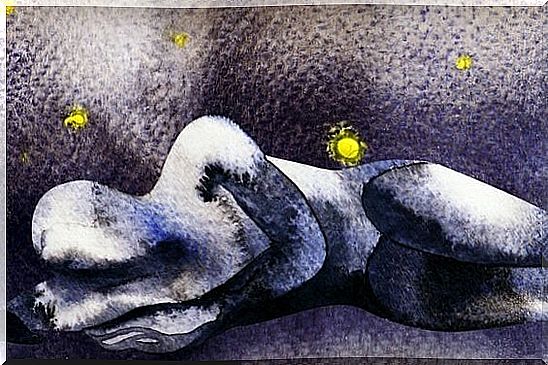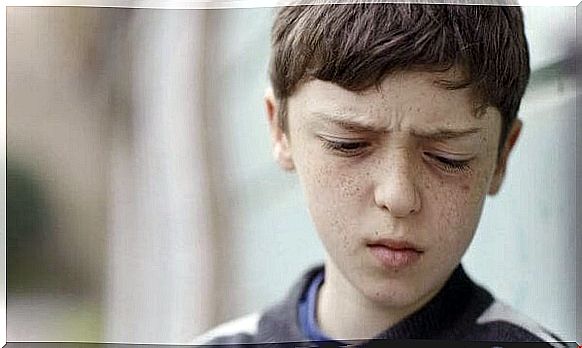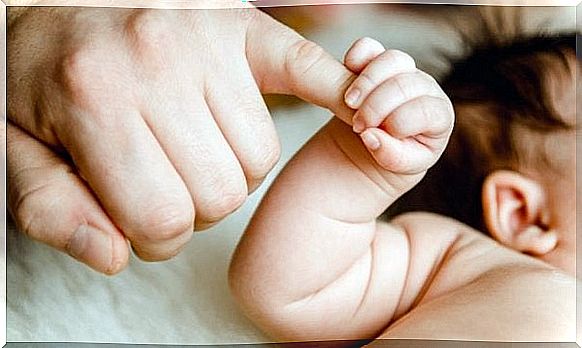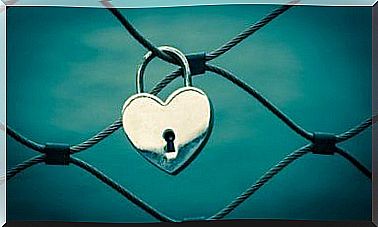The Original Wound – The Influence Childhood Trauma Can Have

The original wound (also known as the primary wound) is an unresolved childhood trauma. It has to do with the violation of a relationship, the crime of a vital bond between children and parents. It is a betrayal and emotional need that has not been met.
This pain has its roots early in our lives and has not yet been resolved. When we reach adulthood, we try to alleviate the pain, but still it continues to affect us.
One of the most important terms in the world of psychology from a psychoanalytic perspective is the wound, as well as the trauma. Freud explained to us that these psychological wounds go from the outside to the inside.
They happen in our most intimate relationships, especially in childhood. Rather than disappearing over time, the wound survives, remains latent and begins to permeate our being. From there, it creates more and more layers, and extends to all levels of our lives it can.
Sigmund Freud and his daughter Anna Freud revealed for the first time how early experiences in our lives affect our personality. In the 90’s, an important book on the same subject was released. Primal Wound tackled a reality that went much further than Freud did. In this book, we read about the silent, invisible childhood trauma experienced by adopted children.
Nancy Verrier, author of the book, pointed out key ideas about the hijacked band. These are the affections that are offended or often subconscious wounds that people tend to carry with them into adulthood. All this is the result of a childhood that missed so much.

People have needs that go beyond food. When a child is born, it must first and foremost feel secure, surrounded by love and supported by affection. Love gives us a place in the world and nourishment. Love helps us to develop in a safe and friendly environment. We come into the world with the knowledge that we are important to someone.
Because of this, a psychologist or therapist will also try to create an environment characterized by empathy and closeness when he receives his patient. People need this type of nutrition. If we can not perceive it, the brain reacts almost immediately. Suspicion, fear and excitement emerge.
This is what a child experiences when they do not feel an intimate bond. The original wound leaves a mark on life when the parents are not available, either emotionally or physically. Slowly but surely, the child’s mind will be invaded by anxiety, emotional hunger, emptiness, loneliness, loss and lack of protection.

We can basically look at the original wound as a weekend robbery. This process of becoming human that we all go through comes first and foremost from an exchange of genuine affection and through constant closeness between mother and child.
We must not forget that a baby comes into the world with an immature brain and needs skin contact and this special bond to continue to grow and develop.
If something fails in this process, if something happens during our first three years of life, an invisible but deep fracture will occur. It is an injury that no one sees. The damage that may make us completely incapable in several aspects of our adult lives. Here are some of them:
Effects of the original wound
There is a very interesting book that is considered to be something of a reference manual for the study of emotional ties. It’s a Handbook of Attachment by psychologists Jude Cassidy and Phillip R. Shaver. In this book, the authors claim that the purpose of man is self-fulfilling. Our purpose is to elevate ourselves, move forward with confidence and promote our personal and emotional growth. In this way we can fully enjoy life with ourselves and others.
One of the most important conditions for this is to have a safe, mature, close and intuitive bond to our needs during our early years. But if this does not happen, this original wound will develop, and with it some consequences:
- Insecurity and low self-esteem
- Impulsivity, emotional neglect
- Increased risk of various psychological conditions
- Difficulty establishing stable, loving relationships
- A “survival personality” develops. We try to show self-sufficiency and security, but the emptiness remains. It is common for these people to need isolation and loneliness. At other times, they seek closeness, even if that closeness is not genuine and can even be harmful.

The most appropriate thing to do in these cases is to ask for professional help. In recent years, therapies such as EMDR (Eye Movement Desensitization and Reprocessing) have become increasingly important.
It is a technology that combines different types of stimuli and information management, so that people can bring out traumatic experiences and wounds from childhood in the light. There you can talk about them, acknowledge them and handle them better.
It is also worth considering basic strategies that tend to be used to try to reconcile with and heal our original wounds. They are as follows:
- Become aware of our latent feelings and give them a name.
- Say our unmet needs out loud (affection, support, lack of protection, empathic closeness, etc.). We must legitimize these needs and not suppress them.
- Reflect on the loneliness we felt in childhood. We must do this without fear, without anger and without shame. Some people avoid thinking about the emptiness they felt during childhood. They prefer not to think about the years of suffering because of how all the pain and discomfort makes them feel. We must take this out, I wounded in the light – the part of us that is still full of anger over not having received enough affection and protection.
- Realize that nothing was your fault. The victim has not committed anything.
- Let yourself let go of your grief and your inner feelings.
- Commit yourself to change, be able to transform yourself, take responsibility for a change that will give you inner well-being.

In conclusion , experts in dealing with the original wound and the trauma it gives cause us to forgive.
Forgiving our parents does not absolve them from guilt, but it does allow us to free ourselves from their influence. It is accepting what happened, accepting the reality of everything we went through. But at the same time, forgiveness will enable us to break free from the circle of fear and release the burden from our hearts. We will be free from pain, anger and yesterday’s memories.
Let’s think about this. This topic is undoubtedly interesting, and it is worth understanding this complex psychological reality.









